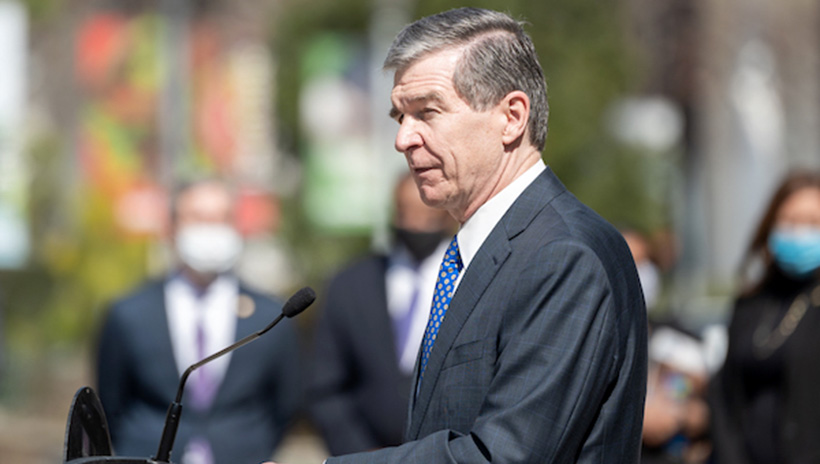Publisher's Note: This post appears here courtesy of the
Carolina Journal. The author of this post is
Andrew Dunn.
N.C. Gov. Roy Cooper, who closed the state one year ago. | Photo: Maya Reagan / Carolina Journal
More than a year after the COVID-19 pandemic brought North Carolina to a screeching halt, Gov. Roy Cooper shows no sign of relinquishing the sweeping and open-ended emergency powers he has claimed under state law.
The General Assembly is now trying once again to clarify exactly what a governor should have the power to do on his own during a state of emergency — and how long "emergencies" should be able to last.
A new bill that would rewrite the state's Emergency Management Act advanced through a
House Judiciary committee this week. It now sits in the House Rules Committee.
North Carolina's current law allows the governor to declare a state of emergency at any time, and it does not end until the governor declares it over. During such a period, the governor has broad powers to regulate gatherings, close schools, shutter businesses, or mandate evacuations.
The law appears to require Council of State concurrence for some of these powers, but when Cooper was challenged last summer over several of his executive orders, a judge ruled that North Carolina's governor can make these decisions unilaterally
Under
House Bill 264, a state of emergency would end within seven days unless the Council of State authorizes it to last longer. The Council of State would then need to vote to continue the state of emergency every 30 days.
The governor would also need Council of State approval to exercise most of the powers to prohibit and restrict activity and business.
"A year ago, when the shutdown order was entered, most people in our state didn't believe that the governor had the ability to shut our entire state down. Most people assumed there were at least some form of checks and balances on that sort of measure," said Destin Hall, R-Caldwell, when the bill was first introduced.
"Our state is going to face other emergencies in the future. We've got to build public trust in an emergency situation. The way we do that, try to take the politics out of it, is through a deliberative process. This bill would give us that deliberative process."
The Council of State is made up of the independently elected statewide officials under the state constitution, including the lieutenant governor, state auditor, state treasurer, and secretary of state. Notably, the bill does not include new legislative oversight.
Other states have taken up similar bills as the coronavirus has shone a light on the shortcomings of most state emergency laws, which historically have been used primarily during hurricanes or other natural disasters.
New York's state legislature, for example,
passed a law this month requiring more oversight of its governor's emergency powers.
In North Carolina, Cooper would need to sign this new emergency powers bill for it to go into effect. This is unlikely. Over the past year, Cooper has vetoed any effort to rein in his control.
Instead, he has preferred to go it alone — something General Assembly leaders have noted.
"The current law that granted these emergency powers was simply not written for today's challenges," Rep. John Bell, R-Wayne, said when the bill was first introduced.
"There needs to be more bipartisan input and checks and balances. There is no unilateral rule in a constitutional republic."
Carolina Journal and the John Locke Foundation have written extensively about Cooper's misuse of his emergency powers. Jon Guze, Locke senior fellow for legal studies, is an expert on the issue. (Read Guze's comprehensive series
HERE.)
Cooper's power moves will have lasting effects, government experts say.
"Because when the pandemic finishes fading out, the threat to North Carolinians from Cooper's seizing power in this fashion will remain," writes Jon Sanders, Locke research editor and senior fellow for regulatory studies.
"It will be an open invitation to future governors, regardless of party. Remember Lord Acton's warning: 'Power tends to corrupt and absolute power corrupts absolutely.'"
























